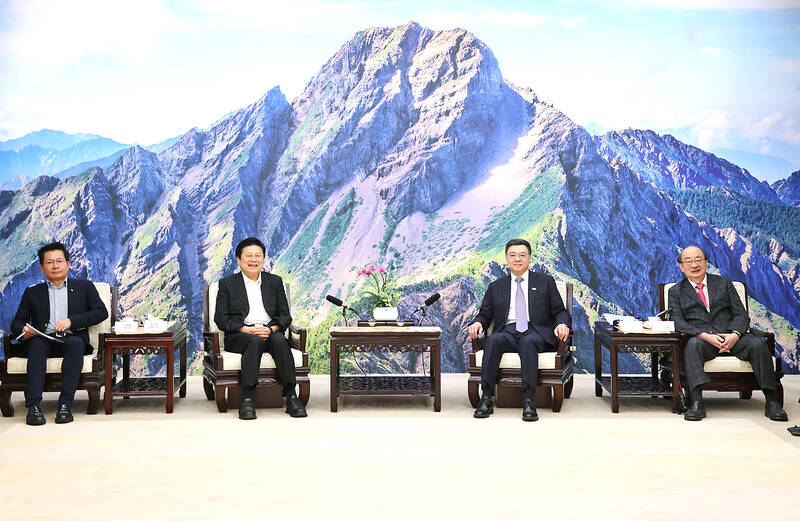Premier Cho Jung-tai (長卓榮) yesterday reached an agreement with opposition parties to provide more compensation to indigenous people for lost logging revenue, hopefully breaking a stalemate in the review of next year’s government budget.
The fiscal budget has been stalled in the Legislative Yuan since the Chinese Nationalist Party (KMT) and Taiwan People’s Party voted to reject it six times in past months.
To break the impasse, Cho invited delegations from all three parties for a sit-down meeting at the Executive Yuan that was also attended by key Cabinet officials, including Vice Premier Cheng Li-chun (鄭麗君), Directorate-General of Budget, Accounting and Statistics Minister Chen Shu-tzu (陳淑姿), Minister of Health and Welfare Chiu Tai-yuan (邱泰源) and Council of Indigenous Peoples Minister Ljaucu Zingrur.

Photo courtesy of the Taipei Photography Association via CNA
Talks appeared to have gone smoothly, as the parties reached an agreement and ended the meeting shortly after 4pm yesterday.
Caucus representatives and their deputies signed an agreement that was shown to reporters outside the Executive Yuan building, with lawmakers planning to schedule a review of the central government budget at today’s Procedure Committee meeting.
Cho agreed to raise compensation for indigenous people who refrain from logging on their lands from NT$30,000 per hectare to NT$60,000 per hectare annually (US$931 to US$1,861).
Officials said an additional budget of NT$4.2 billion would be needed for the plan.
The agreement states that all sides have agreed to complete the procedure “in accordance with amended provisions of the Logging Ban Compensation for Lands Reserved for Indigenous Peoples Act (原住民保留地禁伐補償實施辦法),” and to allocate government funds for the increased compensation.
The act was amended by opposition lawmakers in June to require higher compensation, a move opposed by the government, which said that Article 70 of the Constitution prohibits the legislature from proposing increases to expenditures planned by the Executive Yuan.
The additional budget allocation conforms to Article 91 of the Budget Act (預算法) and Article 5 of the Fiscal Discipline Act (財政紀律法), it said.
On the other two issues of contention, the agreement said that all parties agreed to the Cabinet’s proposal to adjust the “floating point value” in the National Health Insurance (NHI) scheme to NT$0.95 by June 30 next year, which is used to calculate the reimbursement rate to healthcare facilities for medical services.
The Cabinet also agreed to report to the Legislative Yuan by the end of the year on adjusting measures to increase the government’s purchase price for grain.
Opposition parties have demanded a price increase of NT$5 per kilogram to benefit farmers, saying that the price has not been raised for 13 years.
Democratic Progressive Party caucus whip Ker Chien-ming (柯建銘) said that he and his delegation brought goodwill to the negotiations.
By law, the Cabinet is responsible for proposing the budget and the Legislative Yuan must consult with the Cabinet in order to request any substantial increases.
“All parties came here with an open mind and positive attitude for today’s negotiation, to reach an agreement with the Cabinet. It is good to have mutual respect from all sides and agree on issues that also conform to the Constitution, Budget Act and others,” Ker said.
“It is unwise to impede next year’s national budget due to disputes on several smaller issues,” he said.

Taiwan has received more than US$70 million in royalties as of the end of last year from developing the F-16V jet as countries worldwide purchase or upgrade to this popular model, government and military officials said on Saturday. Taiwan funded the development of the F-16V jet and ended up the sole investor as other countries withdrew from the program. Now the F-16V is increasingly popular and countries must pay Taiwan a percentage in royalties when they purchase new F-16V aircraft or upgrade older F-16 models. The next five years are expected to be the peak for these royalties, with Taiwan potentially earning

STAY IN YOUR LANE: As the US and Israel attack Iran, the ministry has warned China not to overstep by including Taiwanese citizens in its evacuation orders The Ministry of Foreign Affairs (MOFA) yesterday rebuked a statement by China’s embassy in Israel that it would evacuate Taiwanese holders of Chinese travel documents from Israel amid the latter’s escalating conflict with Iran. Tensions have risen across the Middle East in the wake of US and Israeli airstrikes on Iran beginning Saturday. China subsequently issued an evacuation notice for its citizens. In a news release, the Chinese embassy in Israel said holders of “Taiwan compatriot permits (台胞證)” issued to Taiwanese nationals by Chinese authorities for travel to China — could register for evacuation to Egypt. In Taipei, the ministry yesterday said Taiwan

Taiwan is awaiting official notification from the US regarding the status of the Agreement on Reciprocal Trade (ART) after the US Supreme Court ruled US President Donald Trump's global tariffs unconstitutional. Speaking to reporters before a legislative hearing today, Premier Cho Jung-tai (卓榮泰) said that Taiwan's negotiation team remains focused on ensuring that the bilateral trade deal remains intact despite the legal challenge to Trump's tariff policy. "The US has pledged to notify its trade partners once the subsequent administrative and legal processes are finalized, and that certainly includes Taiwan," Cho said when asked about opposition parties’ doubts that the ART was

If China chose to invade Taiwan tomorrow, it would only have to sever three undersea fiber-optic cable clusters to cause a data blackout, Jason Hsu (許毓仁), a senior fellow at the Hudson Institute and former Chinese Nationalist Party (KMT) legislator, told a US security panel yesterday. In a Taiwan contingency, cable disruption would be one of the earliest preinvasion actions and the signal that escalation had begun, he said, adding that Taiwan’s current cable repair capabilities are insufficient. The US-China Economic and Security Review Commission (USCC) yesterday held a hearing on US-China Competition Under the Sea, with Hsu speaking on